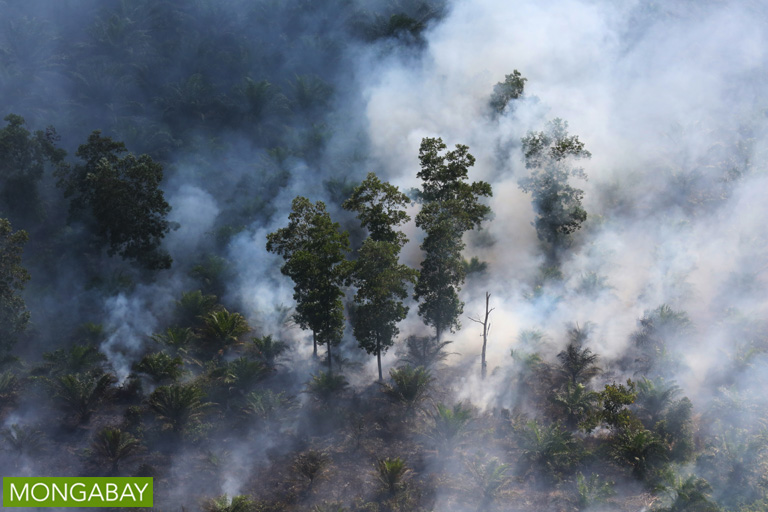- Indonesian daily Kompas reported that military officers on Thursday used a speedboat to access a four-hectare fire burning in Simpang Tiga village, Ogan Komering Ilir district.
- This week the newly appointed police chief criticized Singaporean law for the latitude it gave the city state to sanction Indonesian citizens complicit in burning land.
- The Singapore Environment Council continues to push retailers to remove product lines sourced from companies complicit in wild fires.
Two Indonesian military commanders in Sumatra said this week that they were seeing more fires started at night and on the weekend in order to avoid the military’s more frequent daytime patrols.
The commanding officer of Bukit Barisan barracks, two-star army general Lodewyk Pusung, told Indonesian press he also believed a group of around 150 people from Rokan Hilir district were being paid to start fires. The barracks covers four provinces — Riau, Riau Islands, North Sumatra and West Sumatra.
“[An operation] is going to find out how many people are coming into this area,” Pusung said. “I have heard that they were brought here specifically in order to burn the land and were paid 150,000 rupiah [$11] [each].”
Indonesian daily Kompas reported that military officers on Thursday used a speedboat to access a four-hectare fire burning in Simpang Tiga village, Ogan Komering Ilir district. Colonel Kunto Arief Wibowo said that fire was started at night, and alleged that this was to avoid daytime patrols. He added that operating at night presented greater risks and challenges to his officers.
Indonesian police chief Tito Karnavian said he would follow up on General Pusung’s comments. Karnavian said he had planned to visit Riau province within the next two to three weeks. This week the newly appointed police chief criticized Singaporean law for the latitude it gave the city state to sanction Indonesian citizens complicit in burning land. It was not clear whether he was referring to the Transboundary Haze Act, which Singapore passed in 2014.

On August 30 the National Disaster Management Agency (BNPB) announced all hotspots in Riau were extinguished. The BNPB spokesman called on Riau citizens to prevent further burning in the province’s hinterlands. However, the provincial capital of Riau was still shrouded in smog on Friday, with visibility dipping to 300 meters. The BNPB said Friday’s pollution emanated from smoldering hotspots that had already been extinguished.
Fires continued to burn Friday in other parts of the archipelago. In West Kalimantan, nine of the province’s districts were on official emergency footing in anticipation of further fires. Indonesia’s meteorology agency showed 19 hotspots across the province on Wednesday and Thursday. Data from Global Forests Watch for the previous seven days showed only 3% of fire alerts were in protected lands while 69% of all fire alerts were outside concessions. Some 33% of the total were on peat, the data showed.
Separately, the Singapore Environment Council continues to push retailers to remove product lines sourced from companies complicit in wild fires.
“Consumers should buy from Singapore Green Label products and, more importantly take affirmative actions every day and not just hazy days alone,” said SEC chair Isabella Loh. “We must re-emphasize that these plantation owners must educate their communities and suppliers about the dangers of haze.”
The SEC is classified as a non-governmental organization, but in practice the council is an arm of the state and its recommendations are tantamount to government policy. Singapore’s Green Labeling Scheme certifies more than 3,000 products from more than 50 companies.